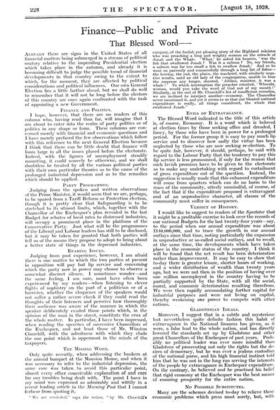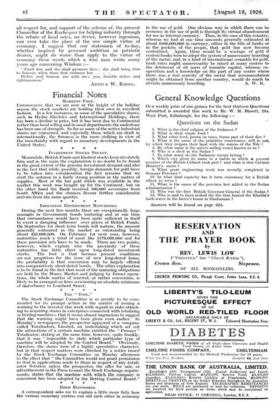Finance—Public and Private
That Blessed Word— ALREADY there are signs in the United States of all financial matters being submerged in a stream of political oratory relative to the impending Presidential election which takes place in the autumn, and already it is becoming difficult to judge the possible trend of financial developments in that country owing to the extent to which, for the moment, they are affected by political considerations and political influences. Our own General Election lies a little farther ahead, but we shall do well to remember that it will not be long before the electors of this country are once again confronted with the task of appointing a new Government.
FINANCE AND POLITICS.
I hope, however, that there are no readers of this column who, having read thus far, will imagine that I am about to enter into the realm of party politics or of politics in any shape or form. These columns are con- cerned merely with financial and economic questions and I have merely prefaced the few observations which follow with this reference to the next General Election because I think that there can be little doubt that finance will loom large in all the issues placed before the electorate. Indeed, with the figures of unemployment steadily mounting, it could scarcely be otherwise, and we shall doubtless be treated by all the various political parties with their own particular theories as to the cause of the prolonged industrial depression and as to the remedies which should be applied.
PARTY PROGRAMMES.
Judging from the spoken and written observations of the Prime Minister, it would seem that we are, perhaps, to be spared from a Tariff Reform or Protection election, though it is pretty clear that Safeguarding is to be stretched to its utmost limits, which, together with the Chancellor of the Exchequer's plan revealed in the last Budget for rebates of local rates to distressed industries, will occupy a prominent place in the platform of the Conservative Party. Just what will be the programmes of the Liberal and Labour leaders has still to be disclosed, but it may be taken for granted that both parties will tell us of the means they propose to adopt to bring about a better state of things in the depressed industries.
EVADING ISSUES.
Judging from past experience, however, I am afraid there is one matter to which the two parties at present in opposition will pay but lip service and concerning which the party now in power may choose to observe a somewhat discreet silence. I sometimes wonder—and the same feeling, I am sure, must have often been experienced by my readers—when listening to clever flights of sophistry on the part of a politician or of a barrister, whether the eloquence of the speakers would not suffer a rather severe check if they could read the thoughts of their listeners and perceive how thoroughly their audience was aware of the manner in which the speaker deliberately evaded those points which, in the opinion of the man in the street, constitute the crux of the whole 'matter. In particular, I have been impressed, when reading the speeches of successive Chancellors of the Exchequer, and not least those of Mr. Winston Churchill, with the adroitness with which they elude the one point which is uppermost in the minds of the taxpayers.
THE MISSING WORD.
Only quite recently, when addressing the bankers at the annual banquet at the Mansion House, and when it was necessary to refer to the industrial depression, the same care was taken to avoid this particular point, almost every other conceivable explanation of and cure for our troubles being dealt with. The point I have in my mind was expressed so admirably and wittily in a recent leading article in the Morning Post that I cannot forbear from quoting it.- " We are reminded," says the writer, "by Mr. Churchill's category, of the foolish yet pleasing story of the Highland minister who was preaching a long and weighty sermon on the miracle of Jonah and the Whale. 'What,' he asked his hearers, was the fish that swallowed Jonah ? Was it a salmon ? No, my friends, a salmon was far too small a fish to swallow Jonah.' And so he went on patiently and resourcefully through a long list of fishes— the herring, the cod, the plaice, the mackerel, with similarly nega- tive results, until an old lady of the congregation, unable to bear the suspense any longer, shouted, ` Aiblins, minister, it was a whale!' To which interruption the preacher retorted, ` Wheesht, woman, would you take the word of God out of my mouth !' Similarly, at the end of Mr. Churchill's list of insufficient remedies, we are inclined to interject another—economy. The Chancellor never mentioned it, and yet it seems to us that our bloated national expenditure is really, all things considered, the whale that swallowed Jonah."
EVILS OF EXTRAVAGANCE.
The Blessed Word indicated in the title of this article is, of course, Economy. It is a word which is beloved at election times by those seeking office and dreaded, I fancy, by those who have been in power for a prolonged period. For the former group it is easy to pay much lip service and to discover how sadly the virtue has been neglected by those who are now seeking re-election. To be quite fair, however, it should, perhaps, be said with regard to the Labour Party that the tendency to pay this lip service is less pronounced, if only. for the reason that such lavish promises have to be given to the electorate as to make any undertaking with regard to curtailment of gross expenditure out of the question. Instead, the suggestion is usually made that this enhanced expenditure will come from quarters which can do no harm to the mass of the community, utterly unmindful, of course, of the fact that if the expenditure proposed is extravagant and of an unproductive character, all classes of the community must suffer in consequence.
VERDICT OF HISTORY.
I would like to suggest to readers of the Spectator that it might be a profitable exercise to look over the records of our national Budgets for the last twenty-four years—say, to the period when our annual expenditure -was about £140,000,000, and to trace the growth in our. annual outlays since that time, noting particularly the. expansion in unproductive or so-called social outlays, and to recall, at the same time, the developments which have taken place in the economic status of the country. I think it will be found that the net result has been deterioration rather than improvement. It may be easy to show that to-day there is greater leisure, shorter hours of working, and a wider distribution of wealth than twenty years ago, but we were not then in the position of having over one million unemployed in the country having to be partially supported by the State, with all the social, moral, and economic deterioration resulting therefrom. We were then rapidly accumulating further capital for industrial imposes and were not living on capital, thereby weakening our power to compete with other nations. . _ ,
GLADSTONIAN IDEALS.
Moreover, I suggest that in a subtle and mysterious but nevertheless quite definite fashion this habit of extravagance in the National finances has given, as it were, a false lead to the whole nation, and has directly lowered the standards set up by Gladstone and other great Chancellors of the Exchequer of past years. Prob- ably no political leader was ever more mindful than Gladstone of prosecuting not only the rights but the de- sires of democracy, but he was ever a jealous custodian of the national purse, and his high financial instinct told him that he was not in the long run serving the interests of the people by extravagance in Exchequer expenditure. On the contrary, he believed and he practised his belief that rigid economy at the Exchequer was the best means of , ensuring prosperity for the entire nation.
No POSSIBLE SUBSTITUTES.
Many are the schemes devised to-day to relieve those economic problems which press most sorely, but, with all respect for, and support of the scheme of, the present Chancellor of the Exchequer for helping industry through the rebate of local rates, no device, however ingenious, can ever take the place of the one simple virtue of economy. I suggest that our statesmen of to-day, whether inspired by personal ambition or patriotic desires, might do worse than apply to the virtue of economy these words which a wise man wrote many years ago concerning Wisdom :— " Exalt her, and she shall promote thee : she shall bring thee to honour, when thou dost embrace her. . . .
Riches and honour are with me ; yea, durable riches and righteousness."
ARTHUR. W. KIDDY.

































 Previous page
Previous page